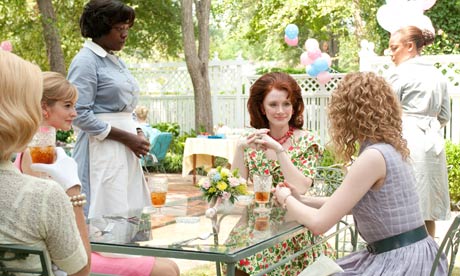
Three already elderly Stieg Larsson thrillers topped last year's all-year bestsellers table, followed by Jamie's 30-Minute Meals (the Christmas No 1) and Guinness World Records, with One Day and The Help just outside the top 10. Glance at 2011's chart, and you could be forgiven for wondering if 12 months have really passed.
For this was a year when old books saw off new ones, and paperbacks sent hardbacks packing. The same seven titles merely change places, with Larsson's musty trio and David Nicholls's and Kathryn Stockett's two-year-old novels all given renewed sales muscle by movie versions.
Joining them are two titles representing the class of 2010 – the nearest thing to new books that the 2011 list's elite group has to offer: a novel by Dawn French (3) that was last year's bestselling debut, and Emma Donoghue's Room (4), Booker-shortlisted and a double bookclub choice. What sets the seal on the triumph of the old is that in this chart – of sales up to 10 December – Jamie Oliver's 2010 effort is well ahead (2) of his latest, Jamie's Great Britain (12), although the timing of the linked TV series will have helped the latter to close the gap in the run-up to Christmas.
With publishing in transition from "physical books" to ebooks (Nielsen's figures are confined to the former) and no overall picture yet available of the ebook market, buying trends are hard to read. But shoppers seem increasingly reluctant to shell out for higher-price titles, other than "manuals" (such as the Guinness annual or cookbooks), where the hardback format clearly makes sense.
This was, anyway, a year lacking in books that demanded to be bought at once – no new novels by Larsson, Dan Brown, JK Rowling or Stephenie Meyer; no must-read celebrity memoirs (only Lee Evans's and James Corden's, 30 and 88 respectively, did well); no quirky hits à la Eats, Shoots & Leaves or last year's meerkat autobiography.
There were hardback successes – Kate McCann's memoir (18) and Terry Pratchett's Snuff (32) in fiction – but they and a handful of pricey cookery titles are markedly outnumbered in a chart dominated by crime, children's stories and commercial fiction aimed at women, all in paperback.
McCann apart, serious non-fiction first published this year is represented only by Caitlin Moran's paperback original How to Be a Woman (81) and Walter Isaacson's biography of Steve Jobs (82); but Bill Bryson's At Home (24) and Edmund de Waal's The Hare with Amber Eyes (23) - the latter aided by a chorus of "books of the year" recommendations last autumn and winning the Costa biography prize – flourished in paperback.
So did a host of literary novels, led by the latest in Kate Atkinson's offbeat crime series, Started Early, Took My Dog (20). Others that charted variously reflected authors with long-established followings and reputations, such as Ian McEwan (33), Sebastian Faulks (62) and Rose Tremain (93); film or TV adaptations, which revived sales of Kazuo Ishiguro's Never Let Me Go (43), and also helped Atkinson and Christos Tsiolkas (37); bookclub selection, for Donoghue and Andrea Levy (58); and award lustre, for Orange prizewinner Téa Obreht (94) and Costa novel prizewinner Maggie O'Farrell (56).
The 2010 Booker winner, Howard Jacobson's The Finkler Question (78), failed to match the performance of its predecessor, Hilary Mantel's Wolf Hall, which was 19th in last year's chart; while the 2011 winner, Julian Barnes's The Sense of an Ending, still in hardback, managed 137th. Sales of the other finalists were far from spectacular. AD Miller's Snowdrops placed 197th, Carol Birch's Jamrach's Menagerie 474th.
In continuing trends evident in previous years, the chart confirms that some genres have lost the appeal that once made them super-sellers. Publishers' obsession with showbiz memoirs looks baffling, when this year's second-best performer only came 88th. Much-touted comedy titles were as usual expected to challenge for top positions, but this annual display of manic optimism similarly reflects a time-warped mindset: The Inbetweeners Yearbook (230) and Steve Coogan's I, Partridge (135) both fell outside the top 100. Cookery is still a money-spinner, but – with Nigella Lawson, Gordon Ramsay and others unable to match Oliver's productivity – there's less sense of a kitchenful of TV chefs who score year after year.
Individuals, too, are losing their clout: eminent storytellers from the 80s and 90s (including Danielle Steel, Jeffrey Archer, Jilly Cooper, Frederick Forsyth, Wilbur Smith) these days struggle to make the cut, and Jodi Picoult could be waning as well. Katie Price fatigue (438) now looks undeniable, and while Top Gear fans may be gobbling up other Clarksoniana, they're no longer bulk-buying the books of columns that once made Jeremy Clarkson (257) a top-20 fixture.
Passing them on the way up are this year's rising stars. America's Jeff Kinney dominates the children's chart, and has five of his Wimpy Kid books in the overall top 30. Lorraine Pascale, with two well-placed spin-off titles (41, 60), is the only newcomer to convincingly challenge the Jamie-Hugh-Nigella-Gordon-Heston old guard of TV cheffery. Epic fantasy writer George RR Martin arrived impressively with titles at 13 and 76. Jo Nesbø's five entries defy talk that the Scandinavian crime boom has run its course, and contribute significantly to Random House at long last overtaking Hachette as top-scoring publishing group.

